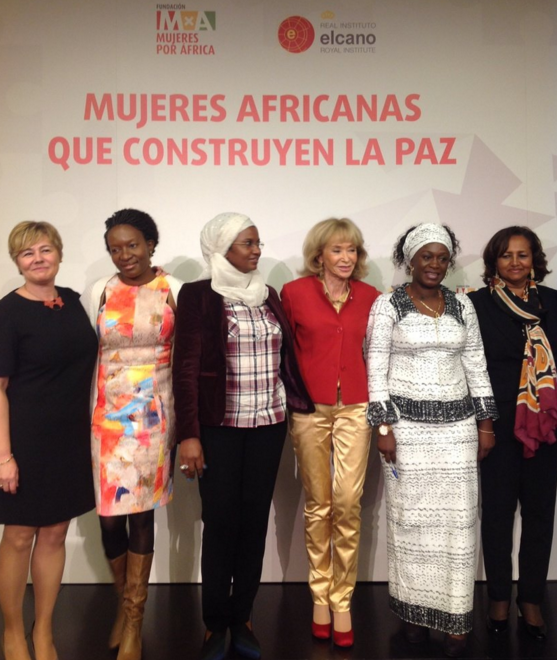Ana Salado talks women, development and cooperation. Speaking of morally-rewarding jobs, here is hers.
Madrid – Ana Salado does not have a regular job. As the Communication Manager of the non-profit Mujeres por África, her tasks go beyond having to keep up with the reporting of projects, receiving visitors, updating social media or covering news regularly. She is also a loyal brand ambassadress of the organization; using an expressive language as she speaks, full of hope and passion. “It all starts with awareness, then there comes the knowledge. Whenever you open a window, you realize there is a whole new world behind it yet to be discovered”, she says to describe the foundations of MXA.
The Madrid headquarters of this NGO tell stories through its tribal decorations. Their main goal is to be a transparent organization, keeping in constant touch with people, both in Spain and in African countries. “We are an organization for development, not a NGO dedicated to help. We promote development in Africa through women with medium and long-term projects”, she explains. The majority of them are implemented in Africa, monitored by a coordinator who travels to the region where the project is being implemented and who reports to Ana and the rest of the team. “We also have a few projects that only take place in Spain, as Africanas en España, providing coverage and support for those nearly 500,000 African women established in Spain and Ellas investigan, an initiative aimed at bringing scientist African women to Spain for a gap year”. This was launched in 2014 and works in association with six Spanish research institutes, being one of them Severo Ochoa.
The president and founder of MXA, former vice president María Teresa Fernández de la Vega, also plays a key role in the communication of these projects. Ana recalls her once saying, “African women have become my great cause to fight for”, and that is how it all started three years ago. “Most of her time is taken up by Mujeres por África”, explains Ana, “she also is State Advisor for the government but manages to remain active and involved. Most of her head and heart are put into our projects”.
Every single project MXA is engaged in is different, but they all share a common goal: empowering women. In order to achieve this, the collaboration of national governments and their knowledge about the implementation of projects is essential. Women have a leading role in Africa as peace agents, and MXA as well as national governments are well aware of it. They are instructed to include women into peace agreements. “Women have starred many peace movements,” says Ana, “their inclusion into governments for these arbitration purposes is slowly developing. Achieving peace is the beginning of everything when there is an armed conflict”. For the most of the Sub Saharan countries, there has been at least one armed conflict in the past 50 years, being women and children the main victims. As Ana tells, “in the case of women, they are used as war weapons by combatants as a strategy to consume the enemy. We must not forget that during war times, women are the only support the civil society has since men are for the most part incorporated into the battlefields.”
Women carry the weight of the household, and that is why they benefit from social services designed specifically for them. Some countries have ministries dedicated to women, which have ratified the Maputo Protocol for Women’s Rights. Ana believes those campaigns help to raise awareness within society. “It is admirable how women are conscious of their rights and capabilities of evolving and contributing to the economy.” Despite common knowledge, women in the African society are extremely aware of their rights, and they know they have to fight for their empowerment. The drawbacks of culture and traditions have a big effect on the evolution of mentality, but Ana is convinced that happens in every culture. “There are some amazing movements for women’s rights, such as the ones in Ghana or Kenya”. She explains that the one in Kenya unifies all women associations of the country, summing up to thirty thousand female activists. “Their influence is so high that it has led to constitutional changes in some occasions.”
Even though Mujeres por África does an outstanding job, there is a lot of work to be done, especially in terms of awareness. “The main thing people can do from home about our women is becoming interested in Africa.” Ana is convinced in Spain we have lived for many years turning our heads against the huge unknown that Africa is, so now it is time to approach them, stop the prejudices, and react. “Sometimes we forget some of our every day life needs are fulfilled by resources from this continent. If people want to help from home, Mujeres por África has a supporting branch called Amigos de la Fundación. Their role is merely as supporters, it does not imply contributing economically. “It is good feedback for us to know there are some people who support the cause, at no cost.”
 Interviewee Ana Salado with interviewer Marta Parra, in the Mujeres por África head office in Madrid.
Interviewee Ana Salado with interviewer Marta Parra, in the Mujeres por África head office in Madrid.
Note: This interview has been translated originally from Spanish.




